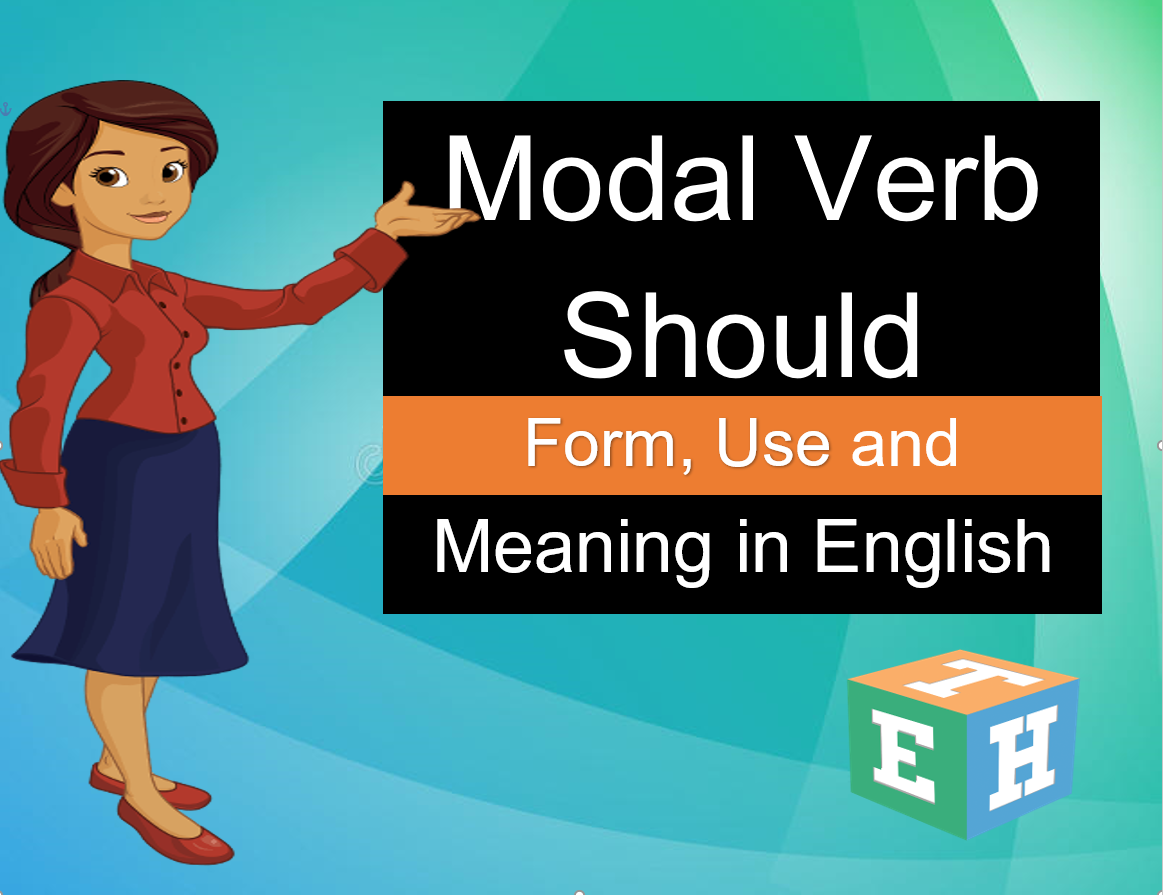Modal Verb Should – Form, Use and Meaning in English
Modal Verb Should – Good day! In this lesson, we will be discussing the list of “Modal verb SHOULD“. This modal verbs explains their examples and meaning as well as how to use of modal verb should in sentences. After the explanation, you can have the downloadable files of the Modal Verb Should lesson for your references.
In this complete tutorial for beginners, learners are going to learn Modal verb should; its form uses and meaning in English.
What is a Modal verbs Should?
Should is a modal auxiliary verb.
“Should” as one of the modal verbs is frequently employed to make suggestions or give advice. It can be used to communicate both obligation and expectation.
When you state something that is most likely the case or will most likely happen in the way you describe, you use should. When you say something should have happened by a certain time, you’re implying that it will most likely happen by that time.
Modal Verb Should Meaning and uses in Sentences
- to describe what is ideal, desired or preferred
- to give advice or make suggestion
- to describe what is likely to happen in the future
- to say “Thank you”
In this lesson you will also learn the forms of “Should” in (affirmative full form and contracted, negative full form and contracted and the question from.)
Time needed: 10 minutes
Here are the Examples of uses and forms of Modal Verb “Should” in Sentences.
- Should in affirmative form:
Subject + should + base form
Examples:
• I should go
• You should go
• He should go
• She should go
• We should go
• It should go
• they should go - Should Negative Form
Full Form: Subject + should no +base form
Examples:
• I should not go
• you should not go
• He should not go
• She should not go
• It
• We
• They
Contracted Form: Subject + shouldn’t + base form
Examples:
• I shouldn’t go
• You
• He
• She
• It
• We
• They - Should in Question Form
Should + Subject + Base Form
Examples:
• Should I go….?
• Should you go…?
• Should he go…..?
Here are the ways on how to use of Modal Verb Should with Examples
- What is ideal or desired
We use should to describe the situation that we think is ideal or preferred.
- There should be more public schools.
- They should reduce the price of oil. It’s so expensive.
- There should be more toppings on the cake.
- To give advice or suggestions
a. We also use should to give advice to someone or to make a suggestion.
- Dan: I’ve a fever.
- Tim: You should see a doctor.
- You should not smoke. It’s bad for you.
- Paul: I really hate teaching.
- Dave: You should look for another job.
b. We use should in the question form to suggest something we aren’t sure about.
Dave: Let’s go to the concert.
Tim: Should we invite Eve and Chris?
Dave: Yes, Good idea!
Helen: Are you cold? Should I turn the heating on?
John: No, I’m okay.
- To describe what is likely to happen in the future
- We also use should to talk about what is likely to happen:
- Shall we begin? Rob’s delayed but he says he should be here in 5 minutes.
- There should be a very big crowd at the party. Mary has so many friends.
- Anne: I’m hungry. When will dinner ready?
- James: It should be ready soon.
- To say thank you.
- This is quite an expression. And the expression is “You shouldn’t have”.
- We often say “You shouldn’t have”., when someone gives us a gift.
- Meaning: Thank you. It wasn’t necessary to buy me a gift.
- Rob: I got you something from Bangkok. A Thai cloth!
- Joy: Oh Rob, you shouldn’t have!
- So, there you are, that’s the form, use and meaning of should, try to use them correctly.
Downloadable Material
Here’s the downloadable material of Tutorial on Modal verbs and Should here. This Document file will help you with the meaning ang teach you more on how to use the modal verb should.
For more readings
- Adjectives in English Grammar – Position in a Sentence
- Reflexive Pronouns and Intensive Pronouns in English
- Adjectives Ending in ING and ED | Participle Adjectives
- ing Verbs English Lesson and Exercises – ing Forms, Spelling Rules and Grammar
- Quiet or quite / Confusing English words
- Expressing PREFERENCES: English Lesson
- Comparing Things with “AS” / English Grammar
- Comparative Adjectives – English Grammar Lesson
- How to agree and disagree in English using short answers
- The difference between “a little” and “little”
- The Difference between A FEW and FEW in English
- When to use “a little” and “a few”: English Grammar Rules
- Compound Words: English Vocabulary
- The difference between MUST and HAVE TO
If you have any questions or suggestions about Modal verb Should, please feel free to leave a comment below or send us a message using our contact page.

